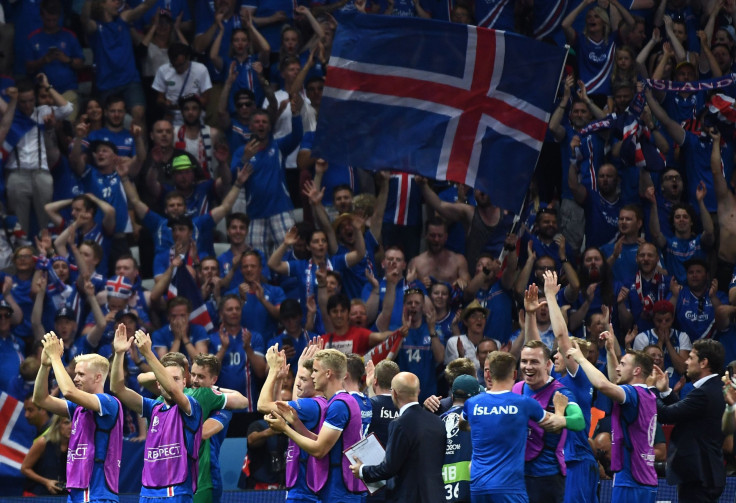Iceland Soccer Team: How Tiny Island Upset England’s Highly Paid Stars at Euro 2016

As now-famous commentator Gudmundur Benediktsson went wild as Iceland celebrated its first-ever soccer win in a major tournament with a late goal against the Czech Republic on Monday, two England scouts watching on at the stadium in Nice, France, punched the air. Meanwhile in Paris, England head coach Roy Hodgson and his assistant Ray Lewington were indulging in some sightseeing, visiting Notre Dame and taking a boat ride along the Seine.
Iceland’s great moment had also brought much joy in the England ranks. It meant, rather than Cristiano Ronaldo’s Portugal, England would be taking on the smallest country ever to qualify for a major tournament in the first knockout round of Euro 2016.
But five days later England’s coach was waving goodbye to his 3.5-million-pound ($4.66 million) salary, forced to resign in ignominy after a defeat that was immediately described as one of the country’s worst ever. Meanwhile, Iceland’s part-time co-head coach, part-time dentist Heimir Hallgrimsson, was toasting his country’s greatest moment on the international stage.
Iceland, a country with a population of less than 330,000, roughly the same as Corpus Christi, Texas, had beaten England, home of the richest league in the world. While England packed its bags, Iceland moved on to the Euro 2016 quarterfinals and a meeting with host France.
Besides the differing circumstances of the two coaches, there are plenty of other facts that paint a picture of just what a fairytale upset it was. Take, for example, Iceland’s goalkeeper Hannes Thor Halldrosson. The man who comfortably kept out an England team led by Wayne Rooney, recipient of 13.5 million pounds ($18 million) a year from Manchester United, as it fruitlessly chased an equalizer Monday, also happens to be a film director. Among his most famous work is Iceland’s entry at the 2012 Eurovision Song Contest.
Just four years ago, shortly after Halldrosson’s international career began, Iceland was ranked No. 131 in the FIFA rankings, behind such soccer heavyweights as Tajikistan, Burundi and the Faroe Islands. In a friendly ahead of the 2012 European Championship, England swept Iceland aside, 6-1.
That's plenty of reason, perhaps, for England’s scouts to have been punching the air with delight and for the headlines of sports sections across England on Tuesday to talk of “humiliation” and “England’s darkest day.”
But such an attitude also betrays the old-world arrogance of a country that has still never won a knockout round match at a European Championship outside of England. It is also an attitude that ignores the huge strides Iceland has made as a soccer nation in the past four years.
"It's important to say it — the English thought it was going to be an easy match," defender Ragnar Sigurdsson, who scored Iceland’s equalizer and made several crucial defensive interventions, said afterward. "But we really have confidence in ourselves. I dreamed of taking on England a few years ago. I'm happy that my wish has come true and above all to have beaten them."

Iceland missed out on qualifying for the last World Cup only after losing in a playoff. And to qualify for Euro 2016 it beat the Netherlands, the third-place finishers at the 2014 World Cup, both home and away. On that evidence and the evidence of how the two teams had played in the group stage in France, it was not really a shock at all.
Certainly it was no freak result. England may have featured a team of players from clubs such as Manchester United, Arsenal, Liverpool and Chelsea, while Iceland’s squad comprises players who ply their trade largely in Europe’s secondary leagues, such as Sweden, Denmark and Switzerland. But unlike England, Iceland had a clear game plan and thoroughly deserved its 2-1 win.
In the postmortem of the defeat, the chief executive of England’s Football Association talked of the need for the national team to finally start punching at its weight. In figuring out how to do so, perhaps England could learn some lessons from Iceland, a country now punching above its weight to a greater degree than any other country in the world.
As well as a concrete idea of how to go about beating England, Iceland has had a plan in place for years to get to this point. First and foremost, it has placed a huge emphasis on coaching. Iceland now has 400 coaches with UEFA B licenses, or one per every 825 people. England, in contrast, has one per 11,000. In Iceland, those credentials are required to coach at every level from Under 10 upward.
And then there is the infrastructure. In a country where winter days can be shrouded in 20 hours of darkness, not to mention the freezing temperatures, Iceland has built readily accessible heated indoor pitches all over the country. It has produced players that may not be filling up the world’s top clubs but that are playing at a good level across Europe.
And now the team has an even bigger scalp in its sights: the chance to knock out the Euro 2016 hosts at the Stade de France. While once again it may be second-best in talent and pedigree, having already come so far, Iceland will not be lacking in self-belief.
"They're a good team who are quite like England," Sigurdsson said of France. "France have not played their best football for the moment. The quarterfinal could be like tonight's match. We'll have to be a bit more dominant and more effective in attack — we should have beaten the English by a bigger score.”
© Copyright IBTimes 2024. All rights reserved.





















